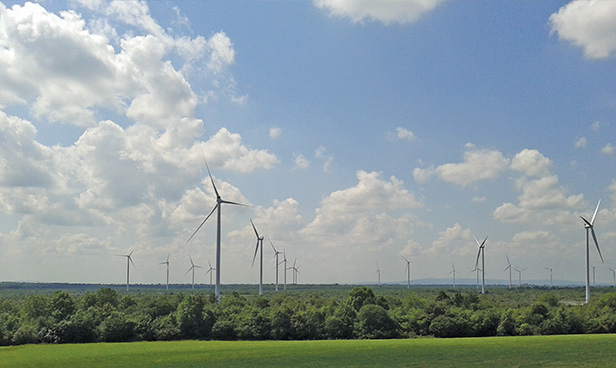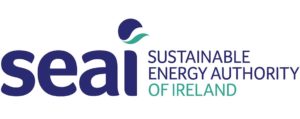
CPPAs: A route to market solution for renewables in a post-subsidy world?
25th November 2019
Cost savings from switching to biomass from oil and LPG
25th November 2019Ireland’s energy research revolution

Publication of Ireland’s Climate Action Plan to Tackle Climate Breakdown in 2019 represents a significant milestone in Ireland’s response to climate change. Phil Hemmingway, SEAI’s Head of Low Carbon Technologies, reflects on the plan, Ireland’s targets, and the importance of energy research and innovation.
The Climate Action Plan outlines the current state of play across key sectors including energy, transport, the built environment, industry and agriculture and charts a course towards ambitious decarbonisation targets. The issue of climate change has come to the fore nationally and internationally, and all countries must play their part in responding. Whilst the publication of the Climate Action Plan represents an important milestone, the real challenge will be in its evolution and implementation. This will require a substantial commitment from across the public and private sectors, the scale of which is likely to eclipse Ireland’s electrification in the 1930s and ‘40s, and the oil crisis 70s.
Progress to 2020 Energy Targets
Ireland has a lot of ground to make up relative to our international counterparts. Whilst final datasets are not yet available, it appears likely that Ireland will achieve approximately 83 per cent of its renewable energy target; 70 per cent of its energy efficiency target; and only 28 per cent of its non-ETS target. The renewable energy target may be further broken into renewable energy from electricity (RES-E), heat (RES-H) and transport (RES-T) where we are likely to achieve 96 per cent, 74 per cent and 69 per cent respectively of the individual targets. The foregoing estimates provide a rough order of magnitude of the potential likely outcomes — the precise numbers will depend on the effectiveness of recent policy interventions, market dynamics and sectoral trends. The light blue bars in the figure show the margin within which Ireland’s achievement of targets is likely to fall. The final analysis of Ireland’s performance against these 2020 targets will be completed when final datasets become available.
It is clear that the electricity segment of the energy sector will lead the way in terms of achievement of Ireland’s 2020 targets. The heat, transport and energy efficiency segments are all likely to achieve 70–75 per cent of their respective targets, whilst Ireland will fall significantly short on its non-ETS emissions target. Bulk decarbonisation of these latter segments will be particularly complex, and significantly increased efforts are needed.
Ambitions to 2030
Ireland’s 2030 targets for renewable energy and energy efficiency will be set out in its National Energy and Climate Plan, whilst the non-ETS emissions target has already been set at a 30 per cent reduction. These targets will be measured on a cumulative rather than a point-in-time basis, and therefore early action in the next decade will be critical to their achievement. The Climate Action Plan sets ambitious goals for 2030, including: 70 per cent of electricity to come from renewables; installation of 600,000 heat pumps; deep energy retrofits to 500,000 homes; one million electric vehicles; major investment in infrastructure; a new microgeneration scheme; enhanced interconnection and increased investment in research and innovation.
The role of research and innovation
Achievement of Ireland’s 2030 energy and climate targets form a core part of current government policy. There is a broad recognition however that the decarbonisation of Ireland’s economy and society is not a short-term play. Research and innovation (R&I) are crucial to address Ireland and Europe’s economic, environmental and societal challenges. They contribute to reaping the new growth opportunities generated from knowledge, technological breakthroughs, process and product innovations, and new business models that support economic performance and help tackle societal challenges. Empirical evidence indicates that two-thirds of economic growth in Europe from 1995 to 2007 derived from R&I activities. Recent analysis by the Department of Business, Enterprise and Innovation shows that R&I-active companies in Ireland perform substantially better from the perspective of sales, exports, value added and employment growth when compared to companies which are not R&I-active.
Substantial public investment in energy research and innovation will help to ensure that companies, research institutions, communities and individuals benefit from the considerable opportunities which will present themselves as we address the climate action challenge. International competition for the enterprise development, foreign direct investment, funding leverage and energy sector investment opportunities which will accompany global decarbonisation will be fierce – strategic strengthening of Ireland’s national energy research and innovation capacity can help to place us at the front of the queue to benefit from these opportunities and also ensure we are on right track to achieve our long-term decarbonisation goals.
Research policy drivers
National and international policy firmly acknowledges the importance of energy research and innovation to medium and long-term decarbonisation goals. At national level, the Department of Communications, Climate Action and Environment’s (DCCAE) Energy Research Strategy states that “in order to fully realise the potential of new and emerging technologies, and to develop and demonstrate clean and sustainable energy solutions, further investment into energy research and innovation in Ireland is needed”. It sets the ambition for Ireland’s energy research system to be world class. Ireland’s Energy White Paper for the period 2015 to 2030 aims to “position Ireland as a leading European energy innovation hub to ensure that Irish-based firms benefit from increasing investment in sustainable energy innovation”. The paper states that “energy research plays an integral part in Ireland’s energy policy”. The Climate Action Plan refers to competitive funding to promote research and innovation to meet the climate challenge and the importance of ensuring that the best scientific evidence is available to underpin energy and climate policy and to support the actions of the plan.
At a European level, the European Commission’s Framework Strategy for a Resilient Energy Union indicates that a new strategy for Research and Innovation must be at the very heart of the Energy Union. The EU budget for research and innovation is likely to increase to €100 billion under Horizon Europe, up from €80 billion under its predecessor Horizon 2020, one of the few areas within the EU 2021–2027 budget to see its funding substantially increased. This is a clear demonstration of the EU’s recognition of the importance of research and innovation.
Ireland’s R&D intensity
One key measure of a country’s resource input into innovation activity is R&D intensity (R&D expenditure as a percentage of GNP). The Europe 2020 strategy sets a 3 per cent objective for R&D intensity for countries across Europe. Ireland’s national target for 2020 is to reach an R&D intensity of 2.5 per cent. The most recent analysis available indicates that this target is unlikely to be met, with R&D intensity currently standing at 1.72 per cent. Whilst the preceding target refers to R&D across all sectors of the Irish economy, detailed analysis by the International Energy Agency indicates that Ireland has one of the lowest investment ratios in energy R&D as a function of total R&D investment amongst OECD countries.
SEAI supports for research and innovation
Times are changing however – energy decarbonisation and climate action are more firmly on the agenda than ever before. SEAI now offers research funding of up to €650,000 per project over four years. Demand has increased more than tenfold in the last two years since a review and re-launch of the programme, and an increased number of larger-scale projects than ever before are being funded. SEAI hosts a cross-government consultation prior to the launch of funding calls, so that projects are positioned to have more direct impact on cross-sectoral policy priorities. Strategic research partnerships have been negotiated with several key organisations, including the ESB; Gas Networks Ireland; Department of Agriculture, Food and the Marine; EPA; Department of Transport, Tourism and Sport; Geological Survey of Ireland; Met Éireann and the Marine Institute. These new partnerships enable a highly joined up approach to the funding of energy research in Ireland.
SEAI-funded research projects cover all areas of the energy sector, including for example:
• SSE Airtricity are leading the FREMI (Forecasting Renewable Energy with Machine Intelligence) RD&D project along with the UCD Centre for Applied Data Analytics. The project intends to develop advanced artificial intelligence techniques which will be used for energy generation and demand forecasting — a topic which will become critical for renewable generators as part of the new Integrated Single Electricity Market (I-SEM);
• NUIG are leading a project on indoor air quality, ventilation and occupant comfort in Irish domestic dwelling’s pre and post deep energy renovations;
• Mullan Grid Consulting, ABO Wind, Coillte and DCU have teamed up to evaluate the relative and combined impact and importance of a range of curtailment mitigation options on high RES-E systems in 2030 and 2040; and
• LIT and Tipperary Energy Agency are leading a project titled FactHP, which seeks to investigate in-situ performance of heat pumps in residential buildings, when compared to predicated performance.
Recent calls have funded projects across a wide range of areas within the energy sector, including offshore technologies, bioenergy, electricity, built environment, smart grid, biomethane, energy efficiency, microgeneration and energy demand management. Additional details on the full suite of funded projects are available on the SEAI National Energy Research Database. This is a useful resource for companies and researchers who wish to know more about active projects, or who are looking for partners with which to collaborate.
Progress is also being made in several other energy research and innovation fora and initiatives — SEAI and DCCAE represent Ireland at the International Energy Agency, and offer an annual funding call to support companies and research institutions to work with world leaders in energy technology development and innovation; SEAI leads Ireland’s involvement in Europe’s Strategic Energy Technology Plan (SETPlan); the potential for Ireland to join the global Mission Innovation initiative is being considered; SEAI’s Prototype Development Funding Programme continues to funding a number of promising ocean energy projects; and support for Horizon 2020 applications is available.
Innovation will be critical to the achievement of Ireland’s medium and long-term decarbonisation goals. The policies, programmes and supports to enable a rapid low carbon transition have been and continue to be strengthened, and plentiful opportunities will present themselves for innovative companies, research institutions, communities and individuals.
T: 01 808 2100
E: energyresearch@seai.ie
W: www.seai.ie



